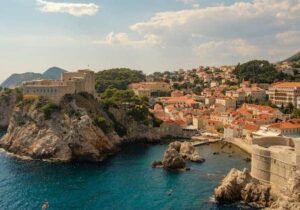
This right is grounded in the principle of jus sanguinis (citizenship by blood), and it enables people to reconnect with their ancestral roots while simultaneously unlocking the benefits of EU citizenship.
Whether you’re looking to apply for EU citizenship by descent for personal, professional, or strategic reasons, this guide covers everything you need to know, from eligibility requirements and documentation to the application process and country-specific rules.
- What is EU citizenship by descent?
- Eligibility Requirements for EU Citizenship by Descent
- Step-by-Step: How to Apply for EU Citizenship by Descent
- Required Documents and Legalization for Citizenship by Descent
- EU Countries That Offer Citizenship by Descent
- How Citizenship by Descent Differs from Naturalization and Other Paths
- Frequently Asked Questions
What is EU citizenship by descent?
EU citizenship by descent is the process of acquiring citizenship in an European Union (EU) member state based on your ancestral lineage. If you can prove a direct blood connection (jus sanguinis) to a parent, grandparent, or sometimes even a great-grandparent who was a citizen of an EU country, you may be eligible to claim citizenship by descent.
By obtaining citizenship in one EU country through ancestry, you automatically gain EU citizenship, granting you the same rights and privileges as any EU citizen.
Benefits of EU citizenship by descent:
- Freedom of movement across all 27 EU member states to live, work, study, or retire.
- Visa-free or visa-on-arrival access to over 170 countries, including the Schengen Area.
- Access to public healthcare and world-class education in EU countries.
- Voting rights in local and EU Parliament elections (if residing in the country).
- The ability to hold dual citizenship, depending on the laws of both your ancestral country and your current nationality.
Each EU country sets its own rules regarding:
- Generational limits or how far back your ancestry can go.
- Required vital records and ancestral documentation.
- Whether you must renounce another citizenship or can retain both.
This pathway is ideal for those seeking to reconnect with their heritage while securing a second citizenship and the benefits that come with it.
Eligibility Requirements for EU Citizenship by Descent
Your eligibility for EU citizenship by descent depends on your ability to prove a direct bloodline to an ancestor who was a citizen of an EU member country. While each country has specific rules, eligibility generally falls into three categories:
1. Citizenship through a parent
This is the most straightforward path. If at least one of your parents was a citizen of an EU country at the time of your birth, you are likely eligible to claim citizenship by descent.
- This typically does not involve generational limits.
- Common in countries like Germany, Ireland, and Portugal.
2. Citizenship through a grandparent or great-grandparent
Some countries extend eligibility beyond parents, provided the lineage is unbroken and documented:
- Ireland permits claims through a grandparent and, in limited cases, a great-grandparent if the parent registered in the Foreign Births Register.
- Lithuania, Poland, and Hungary also allow descent-based claims within defined historical and legal boundaries.
Italy previously allowed citizenship claims through an unlimited number of generations, provided the lineage was unbroken. However, as of March 2025, there was a citizenship shift in Italy where the government enacted reforms to limit citizenship by descent to a maximum of two generations (parents and grandparents).
3. Special historical or legal circumstances
Certain applicants may qualify under exceptional legal provisions, such as:
- Repatriation programs for descendants of individuals who lost their citizenship due to persecution or displacement. An example of this can include Holocaust survivors reclaiming German citizenship.
- Border changes that affected the national identity of regions. Examples include former Austro-Hungarian, Soviet, or Polish territories.
These cases are often more complex and may require proof of historical context, not just lineage.
Keep in mind that eligibility criteria are set at the national level, not by the EU. That means each country decides how many generations back you can claim, who qualifies, and under what circumstances.
Step-by-Step: How to Apply for EU Citizenship by Descent
Wondering how to apply for EU citizenship by descent? While the exact procedure depends on the country, the general process typically follows these steps:
1. Confirm eligibility
- Identify the EU country your ancestor came from.
- Research that country’s rules on citizenship by descent, including generational limits and documentation requirements.
- Determine whether you qualify through a parent, grandparent, or great-grandparent.
2. Collect ancestral documentation
- Gather birth, marriage, and death certificates that establish a clear familial link between you and your ancestor.
- Obtain proof of your ancestor’s citizenship (such as a passport, ID card, or government certificate).
- Build a complete family tree if required by the country’s application process.
3. Verify, translate, and legalize documents
- Ensure your documents are official certified copies.
- Have them translated by a certified translator into the official language of the ancestral country.
- Complete any required apostille or document legalization steps for international recognition.
4. Submit the application
- File your application with the relevant consulate, embassy, or interior ministry.
- Some countries allow online submissions; others require in-person appointments.
- Be prepared to submit a processing fee and wait several months for approval.
5. Receive citizenship confirmation and passport
- Upon approval, you’ll receive a citizenship certificate or national ID number.
- You can then apply for an EU passport, granting you full freedom of movement, work rights, and visa-free access to over 170 countries.
Required Documents and Legalization for Citizenship by Descent
To support your application for EU citizenship through ancestry, you must provide a series of vital records that prove your ancestral lineage. These requirements vary slightly by country but typically include:
Core documents
- Your birth certificate.
- Your parent’s and grandparent’s birth and marriage certificates.
- Your ancestor’s proof of citizenship (passport, ID card, birth record, or citizenship certificate).
- Death certificates (if applicable).
- Any name change records or legal decrees that clarify family links.
Translation requirements
Most EU countries require documents to be translated into the official national language:
- Use a certified or sworn translator recognized by the ancestral country.
- Check whether translations need to be notarized.
Apostille/legalization
To be legally recognized abroad, your documents may need:
- An apostille (if both countries are part of the Hague Apostille Convention)
- Or consular legalization (if an apostille is not accepted)
This process certifies that your documents are authentic and can be used in official procedures abroad.
EU Countries That Offer Citizenship by Descent
Several EU countries offer individuals the opportunity to gain EU citizenship by descent, although the details of each country’s citizenship laws differ.
Below is an overview of the most common and accessible pathways for those seeking European citizenship through ancestry.
1. Ireland
Generational eligibility: 3rd generation
Irish citizenship by descent is available for individuals with at least one Irish parent or grandparent. If one of your parents was an Irish citizen at birth, you automatically qualify for Irish citizenship.
If your grandparent was born in Ireland, you can still apply for EU citizenship by descent by registering your birth in the Foreign Births Register. This must be done before you have children to ensure citizenship can be passed to the next generation.
This system enables families with Irish heritage to maintain a connection with Ireland across generations, granting the right to live, work, and study in Ireland and throughout the European Union.
2. Italy
Generational eligibility: 2nd generation

To qualify, the applicant’s Italian ancestor must not have naturalized in another country before the birth of the next generation or renounced their Italian citizenship.
Additionally, applicants may be required to demonstrate a genuine connection to Italy, such as family residency or cultural ties.
Applicants must submit extensive ancestral documentation, including birth, marriage, and death certificates that establish a direct line to their Italian parent or grandparent.
Those seeking EU citizenship through ancestry can reconnect with their Italian heritage and enjoy the full benefits of dual citizenship and freedom of movement within the EU.
3. Poland
Generational eligibility: 3rd generation or earlier
Polish citizenship by descent is available to individuals with at least one ancestor who held Polish citizenship, typically up to the second or third generation (parent, grandparent, or great-grandparent).
Poland adheres to the jus sanguinis principle, meaning citizenship is inherited by bloodline regardless of place of birth. To apply for EU citizenship by descent in Poland, you must prove your ancestor held Polish citizenship after 1920 and did not renounce it before it could be passed on.
Applicants are often required to provide documents such as old passports, military records, or civil registry entries. This pathway is ideal for those looking to reclaim their Polish heritage and secure European citizenship by descent for future generations.
4. Germany
Generational eligibility: 1st generation only
German citizenship by descent is offered to individuals born to at least one German parent, regardless of place of birth. The parent must have held German citizenship at the time of the applicant’s birth.
Additionally, under repatriation provisions, descendants of Jews and others stripped of their German citizenship during the Nazi era may be eligible to reclaim German nationality.
To qualify, applicants must provide proof of lineage, such as birth certificates, and other supporting documentation. This allows descendants to get EU citizenship by descent and benefit from the right to live and work across all EU countries.
5. Greece
Generational eligibility: 3rd generation
Greek citizenship by descent in the EU is granted to individuals who can prove that one or both parents—or a grandparent—were Greek nationals.
Applicants must submit official documents, such as birth and marriage certificates, linking them to their Greek ancestor. These records must be registered in the Greek Municipal Records.
The Greek citizenship by ancestry pathway enables descendants to reconnect with their roots and gain European citizenship, offering cultural ties and full EU mobility and employment rights.
6. Portugal
Generational eligibility: 2nd generation

For those with a Portuguese parent, citizenship is typically acquired through a straightforward birth registration in the civil registry.
Grandchildren must demonstrate their grandparent’s nationality and some connection to the Portuguese community, sometimes including basic language proficiency.
This process enables people with Portuguese ancestry to enjoy dual citizenship and the many benefits of EU citizenship through ancestry, including free movement and access to healthcare and education across the EU.
7. Hungary
Generational eligibility: 3rd generation or earlier
Hungary offers citizenship by descent to individuals with at least one Hungarian parent or grandparent, provided they can demonstrate the ancestor held Hungarian citizenship at the relevant time.
Applicants must present ancestral documentation such as birth and marriage certificates, and may need to demonstrate basic knowledge of the Hungarian language.
Hungarian citizenship by descent opens access to EU citizenship, allowing applicants to live, work, and travel throughout the European Union and reconnect with their cultural heritage.
8. Spain
Generational eligibility: 2nd generation
Spanish citizenship by descent, also known as nacionalidad por descendencia, allows individuals with a Spanish parent or grandparent to apply for Spanish nationality.
Eligibility includes having at least one Spanish parent, both parents born in Spain, or being adopted by a Spanish citizen before the age of 18. In some cases, individuals from Latin America with Spanish grandparents may also qualify.
Successful applicants gain Spanish citizenship through ancestry, unlocking visa-free or visa-on-arrival access to over 150 countries and the right to live and work throughout the EU without needing a permit.
Country | Generational Limit | Dual Citizenship | Language Requirement |
Austria | 1st generation | Rarely allowed | Yes (for naturalization) |
Belgium | 1st generation | Allowed | Yes |
Bulgaria | 3rd generation | Allowed | Yes |
Croatia | 2nd generation | Allowed | Yes |
Cyprus | 1st generation | Allowed | Yes |
Czech Republic | 2nd generation | Allowed | Yes |
Denmark | 1st generation | Allowed | Yes |
Estonia | 1st generation | Limited | Yes |
Finland | 1st generation | Allowed | Yes |
France | 1st generation | Allowed | Yes |
Iceland | 1st generation | Allowed | Yes |
Latvia | 3rd generation or earlier | Limited | Yes |
Liechtenstein | 1st generation | Not allowed | Yes |
Lithuania | 3rd generation | Limited (repatriation only) | No |
Malta | 2nd generation | Allowed | Yes |
Netherlands | 1st generation | Generally not allowed | Yes |
Norway | 1st generation | Allowed | Yes |
Slovakia | 3rd generation (pending legislation) | Limited | Yes |
Slovenia | 2nd generation | Allowed | Yes |
Sweden | 1st generation | Allowed | Yes |
Switzerland | 1st generation | Allowed | Yes |
How Citizenship by Descent Differs from Naturalization and Other Paths

The most common include naturalization, marriage, investment, and refugee protection, each with its own criteria and application process.
Naturalization
Citizenship by naturalization is the most common path to citizenship for foreign nationals living in the EU without ancestral ties.
It typically requires continuous legal residence in the country, passing a language and integration test and, demonstrating good conduct and economic stability.
This route is ideal for individuals who have established long-term residence and integration in an EU country.
Marriage
Several EU countries offer accelerated path through citizenship by marriage for spouses of EU citizens.
While requirements vary, many nations shorten the residency period and waive some integration conditions if the applicant remains married and cohabiting with their EU partner for a set time (usually 2 to 3 years).
Investment
Some countries offer Citizenship by Investment programs and also so-called Golden Visas (also known as residency by investment) that can lead to citizenship over time.
Examples include Portugal, Greece, and Malta, where significant investments in real estate, business, or government bonds may provide a residency permit. After a qualifying period of residence (typically 5 or more years), investors may apply for naturalization.
This route is often used by high-net-worth individuals seeking dual citizenship and increased global mobility.
<strongRefuge and protection
Individuals who are granted refugee status or subsidiary protection in an EU country can apply for citizenship after a legal period of residence (often shorter than regular naturalization).
The applicant must still meet integration, language, and conduct requirements. This path usually reflects humanitarian obligations under EU and international law.
Frequently Asked Questions about EU Citizenship by Descent
What is EU citizenship by descent?
EU citizenship by descent refers to the process of obtaining citizenship in an EU country based on ancestral lineage.
If you can prove that a parent, grandparent, or great-grandparent was a citizen of an EU member state, you may be eligible to claim European citizenship through ancestry.
How can I apply for EU citizenship by descent?
To apply for EU citizenship by descent, you must first confirm your eligibility under the laws of the ancestral country. Then, collect and legalize supporting documents (birth, marriage, death certificates), complete any required translations, and submit your application to the relevant embassy, consulate, or government office.
How many generations back can I claim EU citizenship?
The number of generations you can go back depends on the country. Countries like Poland has no generational limit, while others like Ireland allow claims through grandparents. Most countries accept claims up to the second or third generation, provided the lineage is well documented.
Do I need to speak the language of the country to apply for citizenship by descent?
Generally, language proficiency is not required for descent-based applications. However, some countries may ask for basic language knowledge, especially if applying through a grandparent or under repatriation rules.
Can I get EU citizenship if my grandparent was born in Europe?
Yes, many EU countries allow individuals to claim EU citizenship by descent through a grandparent. You must prove your ancestral lineage and that the grandparent held citizenship at the relevant time. Some countries also require your parent to have registered that citizenship officially.
Is DNA evidence accepted for EU citizenship by descent?
No, DNA tests are not sufficient for proving eligibility. EU countries require official vital records, such as birth and marriage certificates, to verify lineage. DNA may support your claim but cannot replace legal documentation.
Do I have to give up my current citizenship to get EU citizenship by descent?
In most cases, no. Many EU countries, including Ireland, Italy, Portugal, and Poland, allow dual citizenship.
However, some countries may require renunciation of your original nationality, so it’s important to check local laws.
Can I pass on EU citizenship obtained by descent to my children?
Yes, EU citizenship obtained by descent is often inheritable. Once you obtain citizenship, your children may also be eligible—especially if they are minors. Some countries require registration of the birth or an additional application step to pass it on.
What are common reasons applications for EU citizenship by descent get rejected?
Applications are commonly rejected due to incomplete documentation, unclear lineage, or missing apostilles or certified translations.
Other reasons include an ancestor having renounced their citizenship, applying through an ineligible generational link, or failing to meet country-specific legal conditions.



